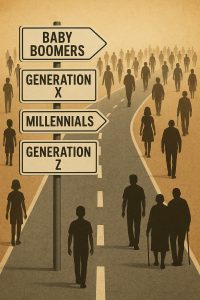Article written with the use of Artificial Intelligence
 How often do we hear phrases like:
How often do we hear phrases like:
We are the last generation that can save the planet.
We are the last generation to know life without the internet.
Effective expressions, often used in political, environmental, motivational, or nostalgic speeches. But there’s a serious problem behind these formulas: the incorrect use of the term “generation.”
In everyday language, the idea has spread that “generation” simply means “us today,” as if the entire living population belonged to the same temporal, historical, and cultural category. This is conceptually incorrect.
In reality, generations follow one another in time, overlap, and coexist. A child born today does not belong to the same generation as someone in their 50s or 70s. Therefore, saying that “we are the last generation that…” presupposes a uniformity that doesn’t exist.
Generations are distinguished (and renewed)
In demography, a generation is defined as the average interval between the birth of parents and the birth of their children, usually around 25-30 years. But in sociocultural parlance, generations are identified in even shorter cycles—often every 7-15 years—to reflect changes in values, historical references, access to technology, and educational models.
Here’s an example of how they are commonly divided:
- Baby Boomers (born 1946–1964)
- Generation X (1965–1980)
- Millennials (1981–1996)
- Generation Z (1997–2012)
- Generation Alpha (2013 onwards)
All these generations coexist in the world today, each with different experiences, roles, and responsibilities in society.
A Rhetorical (and Ideological) Problem
The expression “we are the last generation that…” is also a rhetorical shortcut. It serves to:
- create alarm or moral urgency
- evoke a sense of collective responsibility
- or, conversely, a form of nostalgia/self-celebration (“we know what real life was like”).
But it is not neutral: it is a way of simplifying reality and speaking on behalf of everyone, without distinguishing who is speaking or who is being addressed.
In some cases, it can even contribute to generating artificial tensions, as in discussions of “generational conflict” (young vs. old), shifting attention from the true structural causes of problems to imaginary faults.
Words are not secondary details: they structure thought, guide the way we interpret reality and talk about responsibilities, rights, and possibilities. Misusing the term “generation” simplifies a complex reality, preventing a clear analysis of problems (environmental, social, political) that instead require depth and precision.




